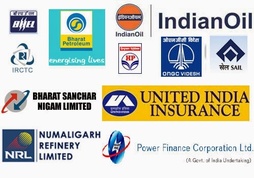A separate thread for the computer Science/IT people appearing for ONGC GT-2013 Exam Do all the queries discussions, speculations, etc here. Being a minority amongst the main thread people, we NEED a separate thread for US.  :smiley…
:smiley…
ONGC GT-2013 for Computer Science -Programming Officer and Materials Management--Handful Recruitment
A separate thread for the computer Science/IT people appearing for ONGC GT-2013 Exam Do all the queries discussions, speculations, etc here. Being a minority amongst the main thread people, we NEED a separate thread for US.
😃😃😃
Syllabus for Computer Science and Information Technology (CS)
ENGINEERING MATHEMATICS
Mathematical Logic: Propositional Logic; First Order Logic.
Probability: Conditional Probability; Mean, Median, Mode and Standard Deviation; Random Variables; Distributions; uniform, normal, exponential, Poisson, Binomial.
Set Theory & Algebra: Sets; Relations; Functions; Groups; Partial Orders; Lattice; Boolean Algebra.
Combinatorics: Permutations; Combinations; Counting; Summation; generating functions; recurrence relations; asymptotics.
Graph Theory: Connectivity; spanning trees; Cut vertices & edges; covering; matching; independent sets; Colouring; Planarity; Isomorphism.
Linear Algebra: Algebra of matrices, determinants, systems of linear equations, Eigen values and Eigen vectors.
Numerical Methods: LU decomposition for systems of linear equations; numerical solutions of non-linear algebraic equations by Secant, Bisection and Newton-Raphson Methods; Numerical integration by trapezoidal and Simpson's rules.
Calculus: Limit, Continuity & differentiability, Mean value Theorems, Theorems of integral calculus, evaluation of definite & improper integrals, Partial derivatives, Total derivatives, maxima & minima.
COMPUTER SCIENCE AND INFORMATION TECHNOLOGY
Digital Logic: Logic functions, Minimization, Design and synthesis of combinational and sequential circuits; Number representation and computer arithmetic (fixed and floating point).
Computer Organization and Architecture: Machine instructions and addressing modes, ALU and data-path, CPU control design, Memory interface, I/O interface (Interrupt and DMA mode), Instruction pipelining, Cache and main memory, Secondary storage.
Programming and Data Structures: Programming in C; Functions, Recursion, Parameter passing, Scope, Binding; Abstract data types, Arrays, Stacks, Queues, Linked Lists, Trees, Binary search trees, Binary heaps.
Algorithms: Analysis, Asymptotic notation, Notions of space and time complexity, Worst and average case analysis; Design: Greedy approach, Dynamic programming, Divide-and-conquer; Tree and graph traversals, Connected components, Spanning trees, Shortest paths; Hashing, Sorting, Searching. Asymptotic analysis (best, worst, average cases) of time and space, upper and lower bounds, Basic concepts of complexity classes €“ P, NP, NP-hard, NP-complete.
Theory of Computation: Regular languages and finite automata, Context free languages and Push-down automata, Recursively enumerable sets and Turing machines, Undecidability.
Compiler Design: Lexical analysis, Parsing, Syntax directed translation, Runtime environments, Intermediate and target code generation, Basics of code optimization.
Operating System: Processes, Threads, Inter-process communication, Concurrency, Synchronization, Deadlock, CPU scheduling, Memory management and virtual memory, File systems, I/O systems, Protection and security.
Databases: ER-model, Relational model (relational algebra, tuple calculus), Database design (integrity constraints, normal forms), Query languages (SQL), File structures (sequential files, indexing, B and B+ trees), Transactions and concurrency control.
Information Systems and Software Engineering: information gathering, requirement and feasibility analysis, data flow diagrams, process specifications, input/output design, process life cycle, planning and managing the project, design, coding, testing, implementation, maintenance.
Computer Networks: ISO/OSI stack, LAN technologies (Ethernet, Token ring), Flow and error control techniques, Routing algorithms, Congestion control, TCP/UDP and sockets, IP(v4), Application layer protocols (icmp, dns, smtp, pop, ftp, http); Basic concepts of hubs, switches, gateways, and routers. Network security €“ basic concepts of public key and private key cryptography, digital signature, firewalls.
Web technologies: HTML, XML, basic concepts of client-server computing.
Anybody here who has any experience of Last year's exam????
ok...here is one thing that i want to ask.....if we give first preference to MM.... hmara question paper to cs ka hi hoga???
Hi Guys,
I am currently working in Accenture and planning to appear for Programming Officer exam.However i have few doubts regarding the marks distribution like what is 25 marks for Qualification out of 100? Also only PG marks will be considered or like from 10th till PG they will consider the score obtained. At last, some links for preparation will be really helpful.
Thanks.
Important national parks in india.......
Dance forms of india and state of origin
Could anyone please suggest me how to prepare for the GK section and also i wanted to know is there any sectional cutoff as nothing was mentioned in the advt.

is there any vacncy fr IT engineers??
 sabka pakka hoga selection fir toh...
sabka pakka hoga selection fir toh...Hey..anybody appearing for SBI IT Officer exam here?
Can anyone tell me the syllabus for the Materials Manager post exam. Should we concentrate only on Operations Management and Materials Management , or questions from any topic of Mechanical engineering ( like, Mechanics, Thermodynamics, IC Engines) can be expected?
If anybody appeared last time please let me know. Thanks in advance
Ps. I have applied for materials Management and Transport Officer profile as an Mechanical Engineer
Hello All,
joing this thread now.
no information regarding sysllabus.
need one clarification:-
I am a cse guy but working as SAP mm funcationla consultant.So my first prefeered job as Materail managemnet officer and sceond is programing officer.
Just wanted to confirm what will come in syllabus..
It will be based on my engineering background. that i related to programming offcer


